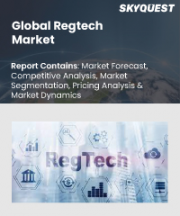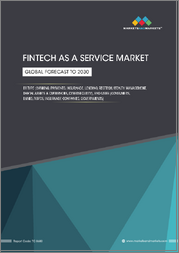
|
시장보고서
상품코드
1832021
레그테크(RegTech) 시장 규모, 점유율, 동향, 예측 : 구성 요소별, 배포 모드별, 기업 규모별, 용도별, 최종 사용자별, 지역별(2025-2033년)RegTech Market Size, Share, Trends, and Forecast by Component, Deployment Mode, Enterprise Size, Application, End User, and Region, 2025-2033 |
||||||
세계의 레그테크(RegTech) 시장 규모는 2024년에 158억 달러에 달했습니다. 향후 IMARC Group은 이 시장이 2033년까지 708억 달러에 달하고, 2025-2033년에 걸쳐 18.0%의 연평균 복합 성장률(CAGR)을 나타낼 것으로 예측했습니다. 현재 북미가 시장을 독점하고 있으며 2024년 시장 점유율은 41%를 넘었습니다. 돈세탁과 낚시를 포함한 사기 행위의 만연, 온라인 결제 수단의 이용 증가, 각국의 규제 당국과 금융기관의 협력 관계 강화 등이 북미 시장 성장을 뒷받침하고 있습니다.
리스크 관리를 개선하고 우수한 데이터 분석 능력을 제공하는 레그테크 서비스에 대한 수요가 증가함에 따라 시장이 확대되고 있습니다. 게다가 돈세탁, 낚시, 사기거래, 기타 고객의 금전절취 등 부정활동 증가가 시장에 긍정적인 영향을 미치고 있습니다. 다양한 상품을 판매하고 출입구 배송을 제공하는 전자상거래 사업자의 수가 확대되고 있으며, 상품이나 서비스를 구입하기 위한 온라인 쇼핑 옵션이 보급되고 있다는 점이 시장 수요를 끌어올리고 있습니다. 또한, 프로세스의 디지털화에 의해 나타나는 문제를 해결하고, 금융 당국이 시장 경쟁의 역학을 보다 깊게 고찰하기 위해 레그테크의 이용이 확대되고 있는 것도 좋은 시장 전망을 가져왔습니다.
미국은 레그테크의 주요 지역 시장으로 부상하고 있습니다. 다양한 산업에서 규제 요건이 복잡해지고 있기 때문입니다. 금융기관은 컴플라이언스 절차를 단순화하고 운영 비용을 줄이고 컴플라이언스 위반과 관련된 위험을 줄이기 위해 레그테크 솔루션을 활용하고 있습니다. 또한 인공지능(AI), 블록체인 및 기타 기술의 활용으로 실시간 데이터 분석이 가능해지고 규제 당국에 대한 보고도 개선되고 있습니다. 또한 규제 당국의 모니터링이 강화되고 컴플라이언스 위반에 많은 처벌이 부과될 위험이 커지기 때문에 조직은 컴플라이언스 자동화를 선호하는 경향이 커지고 있습니다. IMARC Group은 미국의 레그테크(RegTech) 시장이 2024-2032년에 걸쳐 CAGR 21.84%를 나타낼 것으로 예측했습니다.
레그테크(RegTech) 시장 동향
클라우드 컴퓨팅 솔루션의 급속한 보급
클라우드 컴퓨팅이란 다양한 정보 및 기술(IT) 리소스를 인터넷을 통해 온디맨드에 종량 과금으로 제공하는 것을 말합니다. 직원 1,000명 이상의 조직의 94% 이상이 전 세계적으로 클라우드 컴퓨팅을 활용하고 있습니다. 클라우드 컴퓨팅은 기업이 업무를 관리하기 위한 엄선된 도구와 리소스만을 채택하여 대가를 지불할 수 있도록 지원합니다. 또한 기업은 업무 효율성을 높이고 유지 보수 비용을 줄이고 직원의 생산성을 향상시킬 수 있습니다. 이 외에도 기업은 대량의 데이터를 저장하고 업무를 효율적으로 간소화할 수 있습니다. 클라우드 컴퓨팅은 소프트웨어의 자발적인 업데이트와 통합을 제공합니다. 일반적인 DevOps 도구와 로깅 시스템을 통합하면 다양한 생산 절차의 복잡성을 모니터링하고 감지할 수 있습니다. 레그테크 분야의 클라우드 컴퓨팅 통합은 레그테크(RegTech) 시장 점유율에 크게 기여하며 확장 가능하고 비용 효율적인 컴플라이언스 솔루션을 가능하게 하여 세계 금융기관 및 기업 채택을 촉진하고 있습니다.
온라인 결제 수단 채용 증가
온라인 결제 수단과 온라인 결제 게이트웨이는 상품이나 서비스를 지불할 때 원활한 경험을 개인에게 제공합니다. IMARC Group의 예측에 따르면 세계의 디지털 결제 시장 규모는 2024-2032년 사이에 15.6%의 성장률(CAGR)을 나타낼 것으로 예상되고 있습니다. 온라인 결제는 편리성이 높고 온라인 쇼핑으로 현금없는 결제가 가능합니다. 또한 다양한 혜택과 캐쉬백 기능도 제공되므로 온라인 결제 게이트웨이를 채용하는 사람이 늘고 있습니다. 결제 처리의 디지털화가 가속화됨에 따라 은행은 혁신적인 결제 도구를 고객에게 제공해야 합니다. 이는 온라인 결제 증가로 인한 규제 상황의 변화와 함께 레그테크 서비스 수요에 긍정적인 영향을 미칩니다. 이러한 서비스는 은행이 직면하는 규정 준수 및 규정의 복잡성을 효율적으로 해결합니다.
은행 및 금융서비스·보험(BFSI) 업계에서 프로세스의 디지털 변혁 증가
BFSI 산업은 시장 성장을 지원하는 데 필수적인 역할을 하고 있습니다. 2022-2023년에 걸쳐, BFSI 기업은 17만 2,000명의 직원의 순 증가를 달성했습니다. 따라서 BFSI 산업에 중요한 것은 현재의 요구사항에 따라 지속적으로 진화하고 변화하는 것입니다. 디지털 전환은 BFSI 부서에게 개인이 더 간단하고, 자발적이고, 안전한 거래를 할 수 있도록 하는 데 필요한 단계입니다. 또한 BFSI 부서는 고객에게 소득 범위에 맞는 맞춤형 투자 및 보험 옵션과 함께 다양한 맞춤형 서비스를 제공할 수 있습니다. 또한 BFSI의 디지털 변환은 데이터가 중앙 집중화되고 금융기관의 모든 지점에서 액세스할 수 있어 고객의 문제와 문의를 보다 신속하게 해결할 수 있습니다. 이에 더해 레그테크(RegTech) 시장 동향은 BFSI 섹터에서 디지털 전환이 중시되고 있음을 보여주며, AI와 블록체인 등의 첨단 기술을 활용하여 컴플라이언스 프로세스를 강화하고, 개인화된 안전한 금융 솔루션을 제공합니다.
목차
제1장 서문
제2장 조사 범위와 조사 방법
- 조사의 목적
- 이해관계자
- 데이터 소스
- 1차 정보
- 2차 정보
- 시장 추정
- 상향식 접근
- 하향식 접근
- 조사 방법
제3장 주요 요약
제4장 서론
제5장 세계의 레그테크(RegTech) 시장
- 시장 개요
- 시장 실적
- COVID-19의 영향
- 시장 예측
제6장 시장 분석 : 구성 요소별
- 솔루션
- 서비스
제7장 시장 내역 : 배포 모드별
- 클라우드 기반
- On-Premise
제8장 시장 분석 : 기업 규모별
- 대기업
- 중소기업
제9장 시장 분석 : 용도별
- 자금 세탁 방지(AML) 및 사기 관리
- 규제 정보
- 리스크 및 컴플라이언스 관리
- 규제 보고
- 신원 관리
제10장 시장 내역 : 최종 사용자별
- 은행
- 보험사
- 핀테크 기업
- IT 및 통신
- 공공 부문
- 에너지 및 유틸리티
- 기타
제11장 시장 분석 : 지역별
- 북미
- 미국
- 캐나다
- 아시아태평양
- 중국
- 일본
- 인도
- 한국
- 호주
- 인도네시아
- 기타
- 유럽
- 독일
- 프랑스
- 영국
- 이탈리아
- 스페인
- 러시아
- 기타
- 라틴아메리카
- 브라질
- 멕시코
- 기타
- 중동 및 아프리카
제12장 SWOT 분석
제13장 밸류체인 분석
제14장 Porter's Five Forces 분석
제15장 가격 분석
제16장 경쟁 구도
- 시장 구조
- 주요 기업
- 주요 기업 프로파일
- ACTICO GmbH
- Acuant Inc.
- Ascent
- Broadridge Financial Solutions Inc.
- ComplyAdvantage
- Deloitte Touche Tohmatsu Limited
- International Business Machines Corporation
- Jumio
- London Stock Exchange Group plc
- MetricStream Inc.
- NICE Ltd.
- PricewaterhouseCoopers
- Thomson Reuters Corporation
- Trulioo
- Wolters Kluwer NV
The global RegTech market size was valued at USD 15.8 Billion in 2024. Looking forward, IMARC Group estimates the market to reach USD 70.8 Billion by 2033, exhibiting a CAGR of 18.0% from 2025-2033. North America currently dominates the market, holding a market share of over 41% in 2024. The growing prevalence of fraudulent activities, which include money laundering and phishing, rising usage of online payment modes, and increasing collaborations among national regulators and financial institutions are propelling the North American market growth.
The market is expanding due to the growing demand for RegTech services, which improve risk management and provide superior data analytic capabilities. Furthermore, the market is positively impacted by the growing incidence of fraudulent activities, such as money laundering, phishing, illicit transactions, and stealing money from other customers. The expanding number of e-commerce businesses that sell a variety of goods and offer doorstep delivery, as well as the popularity of online shopping choices for purchasing goods and services are boosting the market demand. Additionally, the growing use of RegTech to address issues emerging because of the digitization of processes and give financial authorities deeper insights into the dynamics of competition is offering a favorable market outlook.
The United States has emerged as a key regional market for RegTech as regulatory requirements are becoming more complex in various industries. Financial institutions are increasingly utilizing RegTech solutions to simplify compliance procedures, cut operational expenses, and lessen risks related to non-compliance. Moreover, the use of artificial intelligence (AI), blockchain, and other technologies is enabling real-time data analysis and improving regulatory reporting. Furthermore, organizations are increasingly prioritizing compliance automation due to heightened regulatory scrutiny and the risk of substantial penalties for non-compliance. The IMARC Group forecasts that the United States RegTech market will experience a 21.84% compound annual growth rate (CAGR) from 2024 to 2032.
RegTech Market Trends:
Rapid adoption of cloud computing solutions
Cloud computing refers to the on-demand delivery of various information and technology (IT) resources over the Internet with pay-as-you-go pricing. More than 94% of organizations with over 1,000 employees utilize cloud computing globally. It assists businesses in hiring and paying only for selective tools and resources for managing their operations. It also companies enhance their operational efficiency, reduce maintenance costs, and improve the productivity of their employees. Besides this, it allows organizations to store massive amounts of data and streamline operations efficiently. Cloud computing offers spontaneous software updates and integration. It integrates common DevOps tools and logging systems, which makes it easier to monitor and detect complications in various production procedures. The integration of cloud computing within the RegTech sector has significantly contributed to the RegTech market share, enabling scalable, cost-effective compliance solutions and driving adoption among financial institutions and enterprises globally.
Rising adoption of online payment methods
Online payment methods and online payment gateways provide a seamless experience to individuals while paying for goods and services. The global digital payment market size is expected to exhibit a growth rate (CAGR) of 15.6% during 2024-2032, according to the IMARC Group's predictions. Online payments are convenient and enable individuals to make cashless payments while shopping online. They also provide various offers and cashback features, which is encouraging more people to adopt online payment gateways. The accelerated digital transformation of payment transaction processing is impelling banks to deliver innovative payment tools to their customers. This, along with the changing regulatory landscape due to increasing volumes of online payments, is positively influencing the demand for RegTech services. These services efficiently solve compliance and regulatory complications faced by banks.
Increasing digital transformation of processes in the banking, financial services, and insurance (BFSI) sector
The BFSI sector plays an essential role in supporting the growth of the market. In 2022-23, BFSI firms achieved a net hiring of 172,000 employees to their workforce. Hence, it is important for the sector to continuously evolve and transform according to the current requirements. Digital transformation is a necessary step for the BFSI sector to enable individuals to make simpler, spontaneous, and secured transactions. It also enables the BFSI sector to present various personalized services to customers along with tailor-made investment and insurance options that suit the income range. Moreover, BFSI digital transformation can resolve customer issues and queries much faster as data is centralized and can be accessed from any branch of financial institutions. Besides this, RegTech market trends indicate a rising emphasis on digital transformation in the BFSI sector, leveraging advanced technologies like AI and blockchain to enhance compliance processes and deliver personalized, secure financial solutions.
RegTech Industry Segmentation:
Analysis by Component:
- Solution
- Services
Solution stands as the largest component in 2024, holding 73.0% market share. RegTech solutions use advanced technologies and tools to handle regulatory processes like compliance, reporting, and monitoring. Private and public sector companies use them to prevent rising costs related to regulatory compliance and complex regulations at national and international levels. One key advantage of RegTech solutions is their capacity to streamline processes such as know your customer (KYC), anti-money laundering (AML), and transaction monitoring, which are essential for financial institutions. RegTech tools lessen mistakes and enhance precision by automating tasks like customer onboarding, risk assessment, and reporting that are usually done manually. Moreover, RegTech solutions that are based on blockchain technology improve data security and transparency by generating records that cannot be altered, guaranteeing adherence to data privacy laws.
Analysis by Deployment Mode:
- Cloud-based
- On-premises
On-premises leads the market with 63.5% of the RegTech market share in 2024. The main factors that are influencing this segment are the growing digitization of business operations and the demand for full control over resources. On-premises deployment mode offers more security in the area of data protection and low latency and provides complete control of resources, services, and data to the organization. It provides numerous customizations based on specific needs and access to servers and hardware options. On-premises RegTech deployment offers the key benefit of being able to fulfill strict data security and privacy requirements. Storing data within the company's infrastructure helps reduce the chances of third-party access, cyberattacks, and data breaches, while also maintaining compliance with regulations. Moreover, on-site options provide more opportunities for personalized adjustments to meet a company's unique compliance requirements and processes.
Analysis by Enterprise Size:
- Large Enterprises
- Small and Medium-sized Enterprises
The large enterprises segment leads the market, accounting for 65.0% market share in 2024. As large enterprises deal with a huge amount of data, it is difficult for them to efficiently manage and track information. RegTech firms help large enterprises with their regulatory compliance obligations, improving efficiency, reducing risks, and enhancing user experience. They enable large enterprises to focus on enhancing their customer experience by providing the correct set of tools equipped with modern technology, such as artificial intelligence (AI), machine learning (ML), and the Internet of Things (IoT). RegTech solutions powered by big data analytics enable real-time monitoring, predictive analysis, and automated reporting. These capabilities help enterprises identify potential compliance risks early, ensure transparency, and demonstrate accountability to regulators. Additionally, technologies like blockchain enhance data security and integrity, critical for industries, such as finance, healthcare, and technology.
Analysis by Application:
- Anti-Money Laundering (AML) and Fraud Management
- Regulatory Intelligence
- Risk and Compliance Management
- Regulatory Reporting
- Identity Management
Risk and compliance management leads the market with a 40.8% market share in 2024. The RegTech market overview reflects the dominance of risk and compliance management, driven by increasing cybersecurity threats, with advanced technologies like AI and ML revolutionizing real-time threat detection and regulatory compliance automation. Risk and compliance management involves the identification of financial losses or legal penalties, calculating the uncertainties, and predicting their impact, consequently giving organizations a basis upon which they can make decisions. In risk management, RegTech solutions employ artificial intelligence (AI), machine learning (ML), and predictive analytics to detect potential threats in real-time. These tools allow organizations to identify anomalies, monitor fraudulent activities, and assess emerging risks, ensuring proactive decision-making. In compliance management, RegTech ensures organizations meet dynamic regulatory requirements by automating reporting and documentation.
Analysis by End User:
- Banks
- Insurance Companies
- FinTech Firms
- IT and Telecom
- Public Sector
- Energy and Utilities
- Others
Banks lead the market with 22% market share in 2024. Banks utilize RegTech solutions for multiple purposes, including maintenance of transactional security, compliance management, and prevention of phishing and other fraudulent activities. They also utilize RegTech services to predict potential risk areas and access analytics tools that are required for staying successfully compliant with regulatory bodies. In addition, RegTech solutions help banks automate regulatory reporting and real-time monitoring of financial activities, reducing the reliance on manual processes and minimizing human error. As regulatory requirements grow more complex, RegTech provides banks with scalable and cost-effective tools to maintain compliance, reduce risks, and focus on core business growth. Blockchain technology is also being adopted to create secure, tamper-proof records that enhance transparency and accountability in compliance processes.
Regional Analysis:
- North America
- United States
- Canada
- Asia Pacific
- China
- Japan
- India
- South Korea
- Australia
- Indonesia
- Others
- Europe
- Germany
- France
- United Kingdom
- Italy
- Spain
- Russia
- Others
- Latin America
- Brazil
- Mexico
- Others
- Middle East and Africa
In 2024, North America accounted for the largest market share of 40.7%. Financial institutions and enterprises across North America are increasingly adopting RegTech solutions to address complex regulatory challenges and ensure adherence to evolving laws related to anti-money laundering (AML), Know Your Customer (KYC), data privacy, and cybersecurity. The rise in financial crimes, coupled with the imposition of hefty penalties for non-compliance, is further driving the demand for innovative compliance tools. One of the key trends shaping the North American RegTech market is the rapid adoption of AI and ML technologies. These tools enable organizations to automate processes such as transaction monitoring, fraud detection, and regulatory reporting, ensuring real-time compliance while reducing operational inefficiencies. Blockchain technology is also gaining traction, particularly in financial services, as it enhances transparency and data security, critical factors in meeting regulatory requirements. In November 2024, Regnology announced the acquisition of VERMEG's regulatory reporting dividn, AGILE. Through this acquisition, VERMEG's robust regulatory reporting solution was planned to be added into the Regnology Platform. Moreover, the AGILE solution suite currently supports over 150 global and international banks spanning the UK, Europe, Asia Pacific, and North America.
Key Regional Takeaways:
United States RegTech Market Analysis
In 2024, United States accounted for around 89% of the total North America RegTech market. The RegTech market in the United States is witnessing significant growth, driven by the rising need to combat fraudulent activities and ensure compliance with stringent regulatory frameworks. Organizations and financial institutions are increasingly adopting RegTech solutions to streamline compliance, enhance risk management, and adhere to complex regulations. Leading United States-based companies are at the forefront, offering innovative solutions that leverage advanced technologies to optimize operations and automate compliance processes. Notably, the United States AI market is projected to reach $299.6 Billion by 2026, underscoring the rapid integration of artificial intelligence (AI) in various sectors, including RegTech.
Alongside AI, technologies such as machine learning (ML), blockchain, big data, and cloud computing are driving significant advancements in RegTech tools. These technologies enable real-time data processing, improve decision-making, and reduce compliance-related costs, making them indispensable for regulatory adherence. Furthermore, the growing emphasis on regulatory transparency and efforts to mitigate financial crimes like money laundering and cyber fraud are catalyzing the demand for sophisticated RegTech solutions. This evolving landscape highlights the United States' critical role in advancing global regulatory technology adoption, as it sets benchmarks for innovative and effective compliance solutions in an increasingly digitalized economy.
Europe RegTech Market Analysis
The growing incidences of money laundering and fraudulent activities among large enterprises are significantly driving the demand for RegTech solutions across Europe. This alarming statistic highlights the urgent need for robust compliance and risk management solutions to combat financial crimes effectively. In response, the European Union (EU) has implemented stringent regulatory frameworks, such as the General Data Protection Regulation (GDPR) and Anti-Money Laundering Directives (AMLD), to address the growing number of fraud cases in the financial sector. These regulations have intensified the demand for advanced RegTech tools among both large enterprises and small and medium-sized enterprises (SMEs). SMEs are increasingly adopting RegTech solutions to streamline compliance, minimize costs, and avoid hefty penalties. Additionally, the integration of cutting-edge technologies such as artificial intelligence (AI), blockchain, and big data analytics into RegTech solutions enables organizations to detect and prevent fraudulent activities proactively. This evolving landscape, combined with increasing regulatory pressure, is propelling the growth of the RegTech market across Europe.
Asia Pacific RegTech Market Analysis
The rising adoption of digital payment technologies is significantly driving the demand for RegTech solutions across the Asia-Pacific (APAC) region. India, in particular, has emerged as a leader in digital payments, accounting for approximately 46% of global real-time payment transactions, according to the ACI Worldwide Report 2023. The Unified Payments Interface (UPI) has been a major driving force, contributing to 70% of digital payment transactions in the country during FY 2023-24. This rapid digital transformation is intensifying the need for advanced RegTech solutions to ensure compliance and mitigate risks in an increasingly complex regulatory landscape. Additionally, growing investments in the FinTech sector across APAC is creating a positive market outlook. Emerging economies like Australia, Singapore, and China are adopting cutting-edge technologies such as artificial intelligence (AI), blockchain, and big data to enhance the efficiency and security of their financial systems, further driving RegTech market growth in the region.
Latin America RegTech Market Analysis
The growing need to regulate the expanding digital market in Latin America is driving the adoption of RegTech solutions. Countries like Brazil, Mexico, Colombia, Argentina, and Chile have seen a surge in FinTech startups, further fueling market growth. Additionally, the increasing adoption of advanced solutions for faster and more secure online transactions is creating a favorable outlook. The region's efforts in digital transformation and demand for regulatory technologies are creating significant growth opportunities for the market participants.
Middle East and Africa RegTech Market Analysis
The market in the Middle East and Africa is driven by technological advancements, including the integration of connected devices with AI and IoT solutions. The rising adoption of app-based retail banking, peer-to-peer lending, and share trading platforms is further boosting the demand for RegTech solutions. Additionally, the region is poised to benefit significantly from AI, with the Middle East expected to accrue 2% of the total global benefits of AI by 2030. These developments underscore the growing demand for advanced regulatory technologies to support the region's evolving digital ecosystem.
Competitive Landscape:
Key market players in the RegTech industry are leveraging innovation, strategic collaborations, and market expansion initiatives to strengthen their competitive positioning and improve their business operations. With the increasing demand for compliance automation across industries such as finance, healthcare, and technology, RegTech companies are focusing on advancing their product offerings, enhancing customer-centric services, and expanding their global reach. Another key approach is partnerships and acquisitions.
Market leaders are collaborating with financial institutions, technology providers, and consulting firms to co-develop specialized solutions tailored to industry-specific needs. Acquisitions of smaller, niche-focused RegTech firms allow larger players to expand their portfolios and bring in unique capabilities, such as advanced fraud detection, risk modeling, or cross-border compliance solutions. These partnerships and acquisitions enable companies to broaden their service offerings and cater to a wider customer base. For instance, in August 2024, Tuum and ComplyAdvantage entered into a partnership to deliver faster compliance, reduced risk, and enhanced operational efficiency for financial institutions.
The report provides a comprehensive analysis of the competitive landscape in the RegTech market with detailed profiles of all major companies, including:
- ACTICO GmbH
- Acuant Inc.
- Ascent
- Broadridge Financial Solutions Inc.
- ComplyAdvantage
- Deloitte Touche Tohmatsu Limited
- International Business Machines Corporation
- Jumio
- London Stock Exchange Group plc
- MetricStream Inc.
- NICE Ltd.
- PricewaterhouseCoopers
- Thomson Reuters Corporation
- Trulioo
- Wolters Kluwer N.V.
Key Questions Answered in This Report
- 1.What is RegTech?
- 2.How big is the RegTech market?
- 3.What is the expected growth rate of the global RegTech market during 2025-2033?
- 4.What are the key factors driving the global RegTech market?
- 5.What is the leading segment of the global RegTech market based on component?
- 6.What is the leading segment of the global RegTech market based on deployment mode?
- 7.What is the leading segment of the global RegTech market based on enterprise size?
- 8.What is the leading segment of the global RegTech market based on application?
- 9.What is the leading segment of the global RegTech market based on end user?
- 10.What are the key regions in the global RegTech market?
- 11.Who are the key players/companies in the global RegTech market?
Table of Contents
1 Preface
2 Scope and Methodology
- 2.1 Objectives of the Study
- 2.2 Stakeholders
- 2.3 Data Sources
- 2.3.1 Primary Sources
- 2.3.2 Secondary Sources
- 2.4 Market Estimation
- 2.4.1 Bottom-Up Approach
- 2.4.2 Top-Down Approach
- 2.5 Forecasting Methodology
3 Executive Summary
4 Introduction
- 4.1 Overview
- 4.2 Key Industry Trends
5 Global RegTech Market
- 5.1 Market Overview
- 5.2 Market Performance
- 5.3 Impact of COVID-19
- 5.4 Market Forecast
6 Market Breakup by Component
- 6.1 Solution
- 6.1.1 Market Trends
- 6.1.2 Market Forecast
- 6.2 Services
- 6.2.1 Market Trends
- 6.2.2 Market Forecast
7 Market Breakup by Deployment Mode
- 7.1 Cloud-based
- 7.1.1 Market Trends
- 7.1.2 Market Forecast
- 7.2 On-premises
- 7.2.1 Market Trends
- 7.2.2 Market Forecast
8 Market Breakup by Enterprises Size
- 8.1 Large Enterprises
- 8.1.1 Market Trends
- 8.1.2 Market Forecast
- 8.2 Small and Medium-sized Enterprises
- 8.2.1 Market Trends
- 8.2.2 Market Forecast
9 Market Breakup by Application
- 9.1 Anti-Money Laundering (AML) and Fraud Management
- 9.1.1 Market Trends
- 9.1.2 Market Forecast
- 9.2 Regulatory Intelligence
- 9.2.1 Market Trends
- 9.2.2 Market Forecast
- 9.3 Risk and Compliance Management
- 9.3.1 Market Trends
- 9.3.2 Market Forecast
- 9.4 Regulatory Reporting
- 9.4.1 Market Trends
- 9.4.2 Market Forecast
- 9.5 Identity Management
- 9.5.1 Market Trends
- 9.5.2 Market Forecast
10 Market Breakup by End User
- 10.1 Banks
- 10.1.1 Market Trends
- 10.1.2 Market Forecast
- 10.2 Insurance Companies
- 10.2.1 Market Trends
- 10.2.2 Market Forecast
- 10.3 FinTech Firms
- 10.3.1 Market Trends
- 10.3.2 Market Forecast
- 10.4 IT and Telecom
- 10.4.1 Market Trends
- 10.4.2 Market Forecast
- 10.5 Public Sector
- 10.5.1 Market Trends
- 10.5.2 Market Forecast
- 10.6 Energy and Utilities
- 10.6.1 Market Trends
- 10.6.2 Market Forecast
- 10.7 Others
- 10.7.1 Market Trends
- 10.7.2 Market Forecast
11 Market Breakup by Region
- 11.1 North America
- 11.1.1 United States
- 11.1.1.1 Market Trends
- 11.1.1.2 Market Forecast
- 11.1.2 Canada
- 11.1.2.1 Market Trends
- 11.1.2.2 Market Forecast
- 11.1.1 United States
- 11.2 Asia-Pacific
- 11.2.1 China
- 11.2.1.1 Market Trends
- 11.2.1.2 Market Forecast
- 11.2.2 Japan
- 11.2.2.1 Market Trends
- 11.2.2.2 Market Forecast
- 11.2.3 India
- 11.2.3.1 Market Trends
- 11.2.3.2 Market Forecast
- 11.2.4 South Korea
- 11.2.4.1 Market Trends
- 11.2.4.2 Market Forecast
- 11.2.5 Australia
- 11.2.5.1 Market Trends
- 11.2.5.2 Market Forecast
- 11.2.6 Indonesia
- 11.2.6.1 Market Trends
- 11.2.6.2 Market Forecast
- 11.2.7 Others
- 11.2.7.1 Market Trends
- 11.2.7.2 Market Forecast
- 11.2.1 China
- 11.3 Europe
- 11.3.1 Germany
- 11.3.1.1 Market Trends
- 11.3.1.2 Market Forecast
- 11.3.2 France
- 11.3.2.1 Market Trends
- 11.3.2.2 Market Forecast
- 11.3.3 United Kingdom
- 11.3.3.1 Market Trends
- 11.3.3.2 Market Forecast
- 11.3.4 Italy
- 11.3.4.1 Market Trends
- 11.3.4.2 Market Forecast
- 11.3.5 Spain
- 11.3.5.1 Market Trends
- 11.3.5.2 Market Forecast
- 11.3.6 Russia
- 11.3.6.1 Market Trends
- 11.3.6.2 Market Forecast
- 11.3.7 Others
- 11.3.7.1 Market Trends
- 11.3.7.2 Market Forecast
- 11.3.1 Germany
- 11.4 Latin America
- 11.4.1 Brazil
- 11.4.1.1 Market Trends
- 11.4.1.2 Market Forecast
- 11.4.2 Mexico
- 11.4.2.1 Market Trends
- 11.4.2.2 Market Forecast
- 11.4.3 Others
- 11.4.3.1 Market Trends
- 11.4.3.2 Market Forecast
- 11.4.1 Brazil
- 11.5 Middle East and Africa
- 11.5.1 Market Trends
- 11.5.2 Market Breakup by Country
- 11.5.3 Market Forecast
12 SWOT Analysis
- 12.1 Overview
- 12.2 Strengths
- 12.3 Weaknesses
- 12.4 Opportunities
- 12.5 Threats
13 Value Chain Analysis
14 Porters Five Forces Analysis
- 14.1 Overview
- 14.2 Bargaining Power of Buyers
- 14.3 Bargaining Power of Suppliers
- 14.4 Degree of Competition
- 14.5 Threat of New Entrants
- 14.6 Threat of Substitutes
15 Price Analysis
16 Competitive Landscape
- 16.1 Market Structure
- 16.2 Key Players
- 16.3 Profiles of Key Players
- 16.3.1 ACTICO GmbH
- 16.3.1.1 Company Overview
- 16.3.1.2 Product Portfolio
- 16.3.2 Acuant Inc.
- 16.3.2.1 Company Overview
- 16.3.2.2 Product Portfolio
- 16.3.3 Ascent
- 16.3.3.1 Company Overview
- 16.3.3.2 Product Portfolio
- 16.3.4 Broadridge Financial Solutions Inc.
- 16.3.4.1 Company Overview
- 16.3.4.2 Product Portfolio
- 16.3.4.3 Financials
- 16.3.4.4 SWOT Analysis
- 16.3.5 ComplyAdvantage
- 16.3.5.1 Company Overview
- 16.3.5.2 Product Portfolio
- 16.3.6 Deloitte Touche Tohmatsu Limited
- 16.3.6.1 Company Overview
- 16.3.6.2 Product Portfolio
- 16.3.6.3 SWOT Analysis
- 16.3.7 International Business Machines Corporation
- 16.3.7.1 Company Overview
- 16.3.7.2 Product Portfolio
- 16.3.7.3 Financials
- 16.3.7.4 SWOT Analysis
- 16.3.8 Jumio
- 16.3.8.1 Company Overview
- 16.3.8.2 Product Portfolio
- 16.3.9 London Stock Exchange Group plc
- 16.3.9.1 Company Overview
- 16.3.9.2 Product Portfolio
- 16.3.9.3 Financials
- 16.3.10 MetricStream Inc.
- 16.3.10.1 Company Overview
- 16.3.10.2 Product Portfolio
- 16.3.11 NICE Ltd.
- 16.3.11.1 Company Overview
- 16.3.11.2 Product Portfolio
- 16.3.11.3 Financials
- 16.3.11.4 SWOT Analysis
- 16.3.12 PricewaterhouseCoopers
- 16.3.12.1 Company Overview
- 16.3.12.2 Product Portfolio
- 16.3.12.3 SWOT Analysis
- 16.3.13 Thomson Reuters Corporation
- 16.3.13.1 Company Overview
- 16.3.13.2 Product Portfolio
- 16.3.14 Trulioo
- 16.3.14.1 Company Overview
- 16.3.14.2 Product Portfolio
- 16.3.15 Wolters Kluwer N.V.
- 16.3.15.1 Company Overview
- 16.3.15.2 Product Portfolio
- 16.3.15.3 Financials
- 16.3.15.4 SWOT Analysis
- 16.3.1 ACTICO GmbH



















